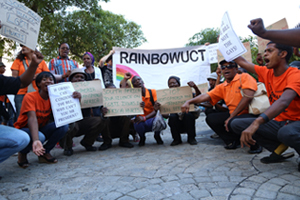Respect for difference is needed to build Africa's sense of community, by Dr Max Price
10 June 2014 | Story by Newsroom
On Monday, 2 June, the Institute for Humanities in Africa at the University of Cape Town hosted a symposium as part of its festival titled Queer in Africa: Confronting the Crisis. The crisis under discussion is the recent wave of legislation across the continent to remove the human rights of members of the lesbian, gay, bisexual and transgender (LGBT) community. The symposium drew together scholars and activists from Algeria, Democratic Republic of Congo, Kenya, Nigeria, Uganda, Zambia, Zimbabwe and South Africa. In my welcome address to them I expressed UCT's sadness, concern and outrage over this legislation. Indeed, the law signed in February 2014 by President Yoweri Museveni of Uganda is an outrage to all Africans. Uganda has not only criminalised homosexual practices, but also prescribes long jail sentences for any advocacy for gay rights. A month previously, Nigerian President Goodluck Jonathan also passed a law banning gay marriage, the promotion of human rights for gay people and public displays of affection between same-sex couples. In 31 sub-Saharan countries, according to Voice of America, same-sex acts are now illegal, with penalties ranging from long prison sentences to the death penalty.
It is a tragic irony that Russia, the host country of the 2014 Winter Olympic Games, also recently passed legislation targeting its gay citizens. After all, the Olympic Games are all about celebrating the best that an athlete can be. And members of the LGBT community are asking for nothing more than freedom to follow a similar ambition: to express the deepest level of their identities, and in that way to realise their full potential in all areas of their lives.
UCT's outrage at this trend is about the denial of freedom and human rights to a significant part of society, simply because of who they are and for wanting to be in relationships with whomever they choose.
The sadness arises from understanding the failure to fulfil one's potential when people are denied the opportunity to grow. As the head of a leading university in Africa, I witness on a daily basis how students' exposure to diverse cultures and belief systems, along with quality education, respect for human rights and the freedom to discuss a spectrum of viewpoints, promotes tolerance and understanding, and can help a young person emerge into a responsible adult ready to discover and exercise the gifts they bring to society. This involves not only what they learn in the lecture theatre and laboratory, but also what they learn from exposure to the cosmopolitan population that UCT attracts. As they enter into adulthood, sexual orientation is one of the areas they often want to discuss and explore in establishing their identities without fear, prejudice or suspicion.
I am moved also by concern. UCT attracts thousands of African students each year. In 2013 about 3000 of our students came from other African countries, including Nigeria and Uganda and 36 other African countries. Probably about 10% are LGBT, and their open sexual orientation on campus means that they now risk persecution when they return home.
Last year University World News reported that 380,376 African students had left their home countries to study abroad in 2010. These Africans represented about 10% of all international students worldwide and as much as 6% of all African students in 2010. The countries where they chose to study were France (29.2%), South Africa (15%), the United Kingdom and the United States (9.7% each), Germany (4.7%); and Malaysia (3.9%), followed by Italy and Australia. So university leaders around the world should be extremely concerned with the health and safety of our students. We and our governments should be defending the human rights of visitors to our countries. We have a duty to protest, to challenge, to isolate those leaders and countries who deny these human rights.
As leaders we must also stand up for the values we seek to instil in our graduates - a commitment to social justice and active citizenship, including campaigns for change when needed. UCT has organised campus-wide demonstrations against violent crime, including gender-based violence. The campus annually holds a "Pink Week", organised by LGBT students and their friends, to promote acceptance of different sexual orientation and celebrate the diversity of the campus community.
In these ways we also express our outrage at the struggle the LGBT community still faces in South Africa, despite the constitutional protection of their rights. The country was shocked by the brutal "corrective rape" and murder of 26-year-old Duduzile Zozo in Thokoza, near Johannesburg, in June 2013. Such crimes are not uncommon but are largely under-reported.
UCT is working to create what we believe a microcosm of Africa should look like: a community of people from different origins, with different views, different lifestyles, different abilities and hardships, different contributions to make to the world - and different sexual orientations. We believe difference is not a barrier to community. We are proud that UCT is widely known among young people as a place where they can come out, and live their sexual identities.
Dr Max Price is the Vice-Chancellor of the University of Cape Town, South Africa.
 This work is licensed under a Creative Commons Attribution-NoDerivatives 4.0 International License.
This work is licensed under a Creative Commons Attribution-NoDerivatives 4.0 International License.
Please view the republishing articles page for more information.










